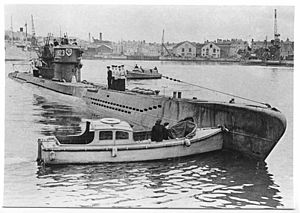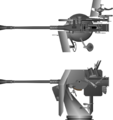German submarine U-1023 facts for kids

U-1023 in Plymouth harbour in May 1945
|
|
Quick facts for kids History |
|
|---|---|
| Name | U-1023 |
| Ordered | 13 June 1942 |
| Builder | Blohm & Voss, Hamburg |
| Yard number | 223 |
| Laid down | 20 May 1943 |
| Launched | 3 May 1944 |
| Commissioned | 15 June 1944 |
| Fate |
|
| General characteristics | |
| Class and type | Type VIIC/41 submarine |
| Displacement |
|
| Length |
|
| Beam |
|
| Height | 9.60 m (31 ft 6 in) |
| Draught | 4.74 m (15 ft 7 in) |
| Installed power |
|
| Propulsion |
|
| Speed |
|
| Range | |
| Test depth |
|
| Complement | 44-52 officers & ratings |
| Armament |
|
| Service record | |
| Part of: |
|
| Commanders: |
|
| Operations: |
|
| Victories: |
|
The German submarine U-1023 was a special type of U-boat used by Nazi Germany during World War II. It was built in Hamburg, Germany, and started service on June 15, 1944. This submarine was able to sink one ship and damage another. After the war ended, U-1023 was sunk as part of Operation Deadlight.
Contents
Submarine Design and Features
U-1023 was a Type VIIC/41 U-boat. This type of submarine was a bit lighter than earlier models. When it was on the surface, it weighed about 759 tons. When it was underwater, it weighed about 860 tons.
Size and Dimensions
The submarine was about 67.10 meters (220 feet) long overall. Its main body, called the pressure hull, was 50.50 meters (165 feet) long. The widest part of the submarine was 6.20 meters (20 feet) across. It stood about 9.60 meters (31 feet) tall and sat 4.74 meters (15 feet) deep in the water.
How it Moved
U-1023 had two main ways to move. On the surface, it used two powerful diesel engines. These engines gave it enough power to travel at a top speed of 17.7 knots (about 32.8 kilometers per hour). When it was underwater, it used two electric motors. These motors allowed it to move at a speed of 7.6 knots (about 14.1 kilometers per hour).
The submarine could travel very far. On the surface, it could go about 8,500 nautical miles (15,742 kilometers) at a slower speed. Underwater, it could travel about 80 nautical miles (148 kilometers) before needing to surface. It could dive to a depth of 230 meters (755 feet).
Crew and Weapons
U-1023 usually had a crew of 44 to 52 sailors. It was armed with several weapons to attack enemy ships. It had five torpedo tubes, which are used to launch torpedoes. Four of these tubes were at the front, and one was at the back. It carried 14 torpedoes in total.
For fighting on the surface, it had an 8.8 cm (3.5 inch) deck gun. It also had anti-aircraft guns to defend against planes. These included a 3.7 cm (1.5 inch) Flak M42 gun and two 2 cm (0.8 inch) C/30 anti-aircraft guns.
Submarine Armament
U-1023 had special anti-aircraft (FLAK) guns. These guns were used to shoot down enemy aircraft.
FLAK Guns on U-1023
The submarine had a single 3.7 cm Flak M42U gun. This was a powerful anti-aircraft gun. It was placed on a special mount called the LM 43U. This mount was one of the last designs used on U-boats during the war.
U-1023 also had two 2 cm Flak C38 guns. These were smaller anti-aircraft guns. They were mounted together on a special M 43U Zwilling mount. This mount had a small shield to protect the gunners.
Service History of U-1023
U-1023 was ordered by the German navy on June 13, 1942. Its construction began on May 20, 1943, at Blohm & Voss in Hamburg. The submarine was officially launched on May 3, 1944. It began its active service on June 15, 1944.
U-1023 was one of the U-boats that used a Schnorchel. This device allowed the submarine to run its diesel engines and get fresh air while staying submerged. This made it harder for enemies to detect it.
First and Only Patrol
After becoming a front-line U-boat, U-1023 started its first and only patrol. It left port on March 25, 1945. On April 23, it attacked a British merchant ship named Riverton. This ship weighed 7,345 tons. Riverton was damaged and had to be run aground near St. Ives Bay.
Later, on May 7, 1945, U-1023 found a Norwegian minesweeper called HNoMS NYMS 382. This was the very last day of the war in Europe. U-1023 sank the minesweeper, and 22 people died.
End of Service
U-1023 surrendered at Weymouth, England, on May 10, 1945. After the war, the submarine was shown off in many ports along the west coast of the UK. Hundreds of thousands of people visited the boat. Finally, U-1023 was sunk by the Allies on January 7, 1946. This was part of an operation called Operation Deadlight.
Summary of Raiding History
| Date | Ship Name | Nationality | Tonnage | Fate |
|---|---|---|---|---|
| 23 April 1945 | Riverton | 7,345 | Damaged | |
| 7 May 1945 | HNoMS NYMS-382 | 335 | Sunk |
See also
- German U-boat bases in occupied Norway
- Actions of 7–8 May 1945
 | Selma Burke |
 | Pauline Powell Burns |
 | Frederick J. Brown |
 | Robert Blackburn |



